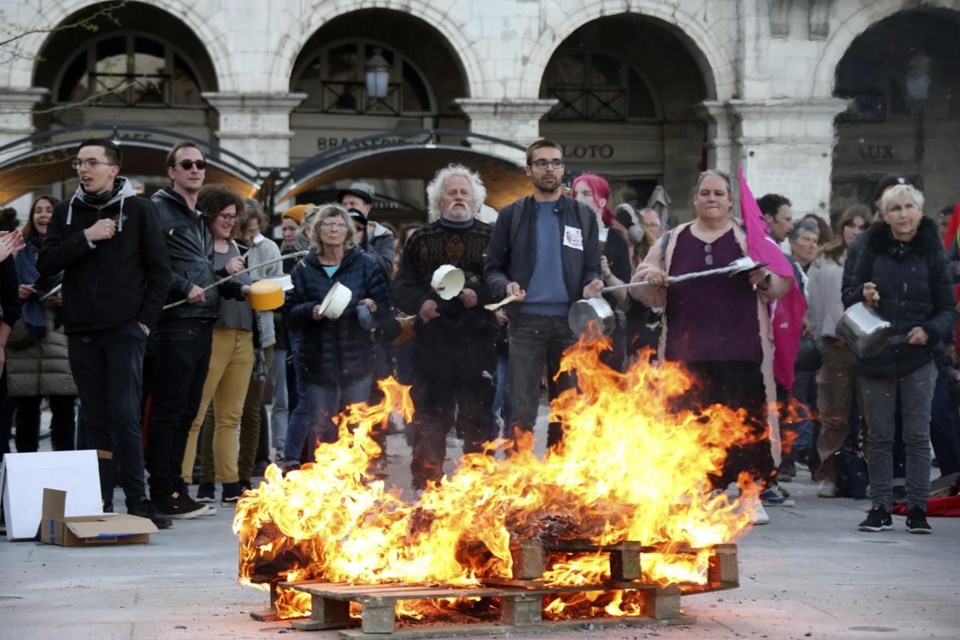PARIS (AP) — French President Emmanuel Macron said Monday that he heard people’s anger over raising the retirement age from 62 to 64, but insisted that it was needed to keep the pension system afloat as the population ages.
In many cities, opponents to the pension law took to the streets to bang pots and pans during Macron's televised address to the nation, with the rallying cry: “Macron won’t listen to us? We won’t listen to him!”
In Paris, the gatherings quickly turned into spontaneous demonstrations in several neighborhoods, with some people setting fire to trash cans as police attempted to disperse the crowd. Hundreds of people also started marching in the western cities of Rennes and Nantes.
In many other places across France, the protests remained peaceful, with people chanting and dancing in front of city halls to the sound of pots and pans used as drums. Many are rejecting the changes as unfair, arguing the government could have raised taxes on the wealthy or employers instead.
In his speech, Macron said “this changes were needed to guarantee everyone’s pension,” after he enacted the law on Saturday. “They represent an effort, that's true.”
“Gradually working more means also producing more wealth for our whole country,” he added.
Macron stressed that no consensus has been found with unions and other political parties. “Has this reform been accepted? Obviously, no,” he admitted.
The evening address kicks off a likely arduous battle for the French president, who is trying to repair the damage done to his public image and politics by forcing the pension plan through parliament last month.
Macron acknowledged “anger” over increasing prices and jobs that don't “allow too many French people to live well.”
Praising the “calm and respectful manner” with which most people demonstrated, he said “nobody, and especially not me, can remain deaf to this demand for social justice and for our democratic life to be renovated.”
He said the door remains open for union, which have already declined an invitation to meet with him on Tuesday.
He announced negotiations in the coming months about “key issues” like improving employees' income, pushing professional careers forward, better sharing wealth and improving working conditions, including for older workers.
Macron hopes his proposals will help the country move away from the period of protests and strikes over the retirement age that threatens the ambitions of his remaining four years in power.
Opponents' gatherings have been banned by authorities in the cities of Dijon and Marseille, with local prefectures arguing there is a risk of “public disorder.”
Earlier in Marseille, police arrested 13 people after gas and power meters were strewn outside a government building in an unusual trade union demonstration against pension changes. Police police said there was a loud blast as the meters were being dumped and that an officer on guard was hit by flying debris.
Prime Minister Elisabeth Borne said Saturday that the government would move ahead with more reforms now that the pension law has been enacted. “In the coming weeks and months ... we are determined to accelerate," she told the national council of Macron’s Renaissance party.
Macron notably committed to bring the unemployment rate down to around 5%. France unemployment rate recently reached 7.2%, its lowest rate since 2008.
Weakened in parliament, where his centrist alliance lost its absolute majority in legislative elections last year, Macron's government needs to get support from lawmakers from diverse political forces to push ahead with his program. That's likely to be an uphill task in the uproarious climate of protest sparked by his retirement changes that pick at France's cherished social safety net.
Borne said Saturday she was “convinced” it was still “possible” to pass bills at parliament by negotiating with lawmakers from the left and the right on a case by case basis.
Labor unions that have been at the forefront of protests, mobilizing millions of marchers in 12 days of nationwide demonstrations and strikes since January, are vowing to fight on. They called for another mass protest on May 1, which is International Workers’ Day.
The pension changes were enacted into law Saturday, the day after the country’s constitutional body rejected some parts of the legislation but approved the higher minimum retirement age.
That key change — central to Macron’s plan and the focus of opponents’ protests — was intended to be a showcase measure of Macron’s second term. But it has come at significant cost to the French president: opinion polls show his popularity has plunged to its lowest level in four years.
___
John Leicester contributed to this report.
Sylvie Corbet, The Associated Press

